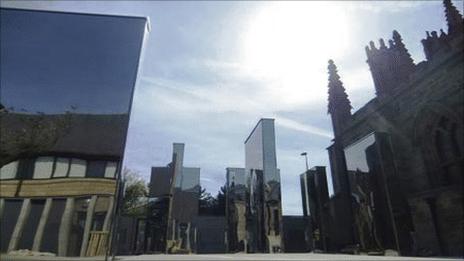Memorial garden for Arandora Star victims
- Published

The names of the Scottish victims have been inscribed on a monument in the Italian cloister garden at St. Andrew's Cathedral
A memorial garden dedicated to dozens of Scots-Italians who died in a wartime tragedy is being officially opened in Glasgow.
Scotland's first minister and the Archbishop of Glasgow will open the garden in memory of those killed when the Arandora Star was sunk by a German submarine off Ireland in 1940.
About 100 Scots-Italians were among the 800 victims of the attack.
The only living survivor will attend the ceremony at St. Andrew's Cathedral.
The Arandora Star was a converted liner being used to transport internees and prisoners of war to Canada when it was sunk by a torpedo from a German U-boat.
The names of the Scottish victims have been inscribed on a monument in the Italian cloister garden, which has been created next to the Roman Catholic cathedral.
'Largest in world'
The silver-mirrored central monument, which organisers say is the largest in the world dedicated to the Arandora Star tragedy, stands next to a 200-year-old olive tree which was gifted by the people of Tuscany.
The official opening will be attended by First Minister Alex Salmond and the Roman Catholic Archbishop of Glasgow Mario Conti.

The Arandora Star was sunk by a torpedo from a German U-boat in 1940
Rando Bertoia, 91 - the only living survivor of the tragedy - is also due to attend, along with victims' relatives.
Also present will be Giulia Chiarini, the architect from Rome who designed the garden and monument, and mayors of the towns from which most Scottish Italians come - Barga and Pistoia in Tuscany and Picinisco, and Filignano in the Lazio region south of Rome.
Musicians from Milan will be flown in to provide musical accompaniment to the events and Glasgow Italian opera singer Luigi Corvi will sing Schubert's Ave Maria as the garden is blessed.
Archbishop Conti said the central monument was an interactive installation designed to encourage people to "reflect on the great mysteries of life, death and resurrection".
He added: "What people will see and experience on a visit to the garden is a result of the generosity of today's Scots-Italian community who raised the funds to create the installation."
Mr Salmond, who helped launch the project three years ago this month, said: "This oasis of peace and contemplation at St Andrew's Cathedral is a magnificent tribute to the those who tragically lost their lives aboard the Arandora Star during the Second World War and to the part the Scots-Italian community plays in the rich tartan fabric of our nation."
- Published2 July 2010
- Published1 July 2010
- Published10 June 2010
- Published10 June 2010
- Published24 May 2010